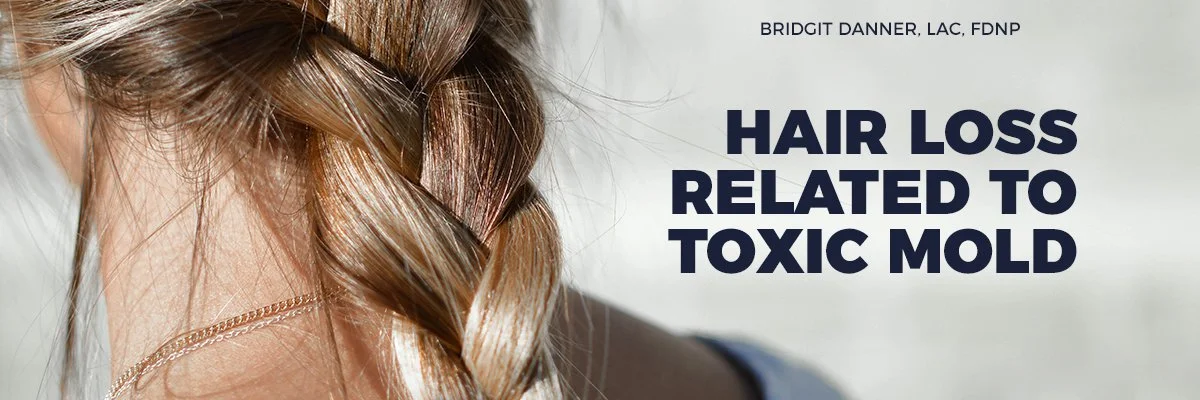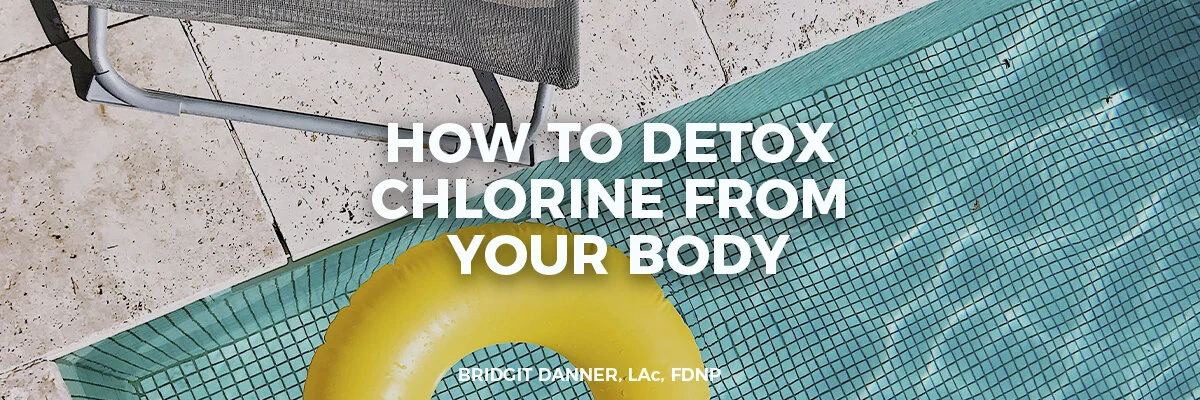There are many, many reasons for hair loss–from thyroid disorder to stress. If you’re suffering from hair loss, this article will provide some causes to consider, especially if you’ve been exposed to toxic mold.
How Your Hair Grows
I have recently been very fascinated by the subject of hair loss, and was also fascinated to learn how hair grows.
Hair is a diva! Each hair is on its own timeline, and is sensitive to many factors. If you want long, healthy, thich hair, you need to nourish it consistently with good nutrition and low stress.
You scalp hair grows in 4 phases:
1. Anagen phase
This is the growth phase where a hair spends most of its time (85%). You can grow up to an inch a month. This is also the stage in which melanin (hair color) is made. This phase can last 3-10 years!
Cell division in the matrix of the hair bulb produces keratinocytes, forming the layers of the individual hair shaft. Melanocytes in the hair bulb provide the keratinocytes with pigment. Hair grows faster in summers than winters.
2. Catagen phase
This is a short 10-day phase in which the blood supply is cut off to the hair. 1-3% of hairs are in this phase.
3. Telogen phase
This is a phase in which the hair is still there but no longer growing. It lasts about 100 days. 10-15% of hairs are in this phase.
During the telogen (or resting) phase, a new follicle appears below the original follicle.
Dysfunctions during the telogen or anagen result in hair loss. Some forms of hair loss are associated with a prolongation of the telogen phase commonly referred to as telogen effluvium. Other forms of hair loss are related to a failure to produce viable hair during the anagen phase.
4. Exogen phase
This is when the hair falls out. We shed 50-100 hairs a day. If the hair follicle is still healthy, the process will begin again. (source, source)
Broader Causes of Hair Loss
Above I’ve outlined the normal process of hair growth. But what happens to hair that is not growing like it’s supposed to be?
For both men and women, hair loss can be genetic, but it’s not always the reason. Genetic hair loss usually follows a certain pattern on the head, and is relatable to other family members, inherited from either parent.
This is called androgenic alopecia or male-pattern baldness and it’s not sudden–rather it’s a gradual thinning of the hair over time, usually at the crown and temples.
Sometime after puberty, your follicles become sensitive to dihydrotestosterone (DHT), a form of testosterone. Eventually the follicle may become very thin and stop producing hair. In women, hair loss is usually more diffuse and baldness is rare.
Although genetics may be at play, epigenetics are a factor too and even androgenic alopecia can be influenced.
Here are some offer factors that can lead to sudden or gradual hair loss:
Anemia* (source)
Eating disorders
Anesthesia
Chemotherapy
Childbirth
Menopause
Thyroid disease*
Aging
Systemic inflammation*
Stress*
Protein deficiency
Nutrient malabsorption*
Allergies including food, pollen, mold*
Blood sugar imbalance*
PCOS
Insulin resistance*
Heavy metals
Lyme disease* (source)
Digestive disorders*
Nutrient deficiencies (source)
Lupus*
Lichen planopilaris* (source)
Prednisone
Alopecia areata (an autoimmune disease of the hair follicles)*
Drug use such as cocaine
Extreme diets
High fevers
Parasites* (source)
Mitochondrial disorders* (source)
Fungal infections* (source)
Tap water
Atopic dermatitis
Birth control pills
Pool water
Sleep disorders*
Mold and chemical exposures*
Obviously this is a long list and it’s not even 100% complete. I encourage you to think about your diet and stress level, your environment, and your gut health. Have you had any blood work recently? Are you working with a functional health practitioner?
Here’s a bit more about stress and hair loss:
“ 1) stress (either acute or chronic) could be a primary causal factor in triggering hair loss by telogen effluvium; 2) stress could be a secondary factor in exacerbating hair loss due to a preexisting disorder, such as endocrine imbalance, toxin exposure, nutrient deficiency, or autoimmune disease; and 3) stress could be induced by the psychological effects of losing one's hair, which then might exacerbate the problem in a classic ‘vicious circle.’
Mice exposed to footshock or noise exhibit hair loss as a result of prolonging the telogen phase, thereby delaying anagen phase induction,7,52 or by prematurely terminating the anagen phase, leading to more rapid development of the catagen phase.9 The mechanisms responsible for these effects appear to be complex, involving multiple biologic pathways.10 At a cellular level, various stressors may induce a local inflammatory response that leads to an inhibition of keratinocyte proliferation as well as an increase in apoptotic death of keratinocytes in telogen-stage hair follicles.8 “
Source: Novak MA, Meyer JS. Alopecia: possible causes and treatments, particularly in captive nonhuman primates. Comp Med. 2009 Feb;59(1):18-26. PMID: 19295051; PMCID: PMC2703143.
How These Conditions Relate to Mold
I put an asterisk on the conditions above that can be related to toxic mold exposure. Here’s a bit about mold and how it affects your body:
Mold can grow excessively in any indoor environment that has been exposed to high humidity or water damage. Not all molds are ‘toxic’ but about a dozen are, and any high load of mold is a burden on your body.
Most mold growth is not easily visible to the naked eye; it is often behind walls, etc.
Mold can enter, primarily, through the air and enter into your bloodstream, tissues and cells. The mycotoxins from mold are incredibly potent and excellent travelers. They can:
Break down your brain and gut barrier
Weaken immunity leading to multiple infections
Raise or lower your hormones levels
Cause weight gain
Cause brain and mood disorders
Effect the respiratory system
Cause systemic inflammation
Help spark autoimmunity
Effect melatonin levels and sleep
Cause stress
Inhibit nutrient absorption
Cripple your mitochondria
Cause thyroid disorders
Mycotoxins are incredibly potent, and you may go through even years of hair loss before you finally discover mold as a cause.
We have a popular client video here about alopecia areata, an autoimmune condition that can be triggered by mold.
Surprisingly, 2% of us will have alopecia areata at some point in our lives! But the good news is that it is “transient” and does not scar the follicles. (source)
“Alopecia areata universalis is an autoimmune disease caused by a peri- and intrafollicular infiltration of T lymphocytes and macrophages, thereby leading to defective anagen-stage hair shafts and miniaturization of the follicles.” (source)
How to Test for Mold Exposure
Mold testing in the body has become thankfully easy and effective. Through a wellness practitioner, you can run a home urine test. We offer it HERE.
Home testing (also consider your RV, car, and workplace) can be trickier. You can read more about options here.
If you do find mold in your body, you need to find the outside source. It is usually a current exposure (consider all places), but occasionally it’s leftover from another place.
What to Do About Hair Loss
Hair loss is frustrating but unless the hair follicle is permanently damaged the good news is that you can usually restore your hair!
1. Nutrition
A few months ago I tried liquid collagen for the first time. I didn’t have any goals, I was just curious about it.
After a couple months, I noticed I had less hair coming out in the shower. And then a month later, I noticed that I had a whole crop of baby hairs.
I actually did not try the collagen for hair loss, but it made my hair grow and shed less! I’ve always had very thin hair that I wished could grow more so it’s been exciting.
I can say that I’ve taken powdered collagen for about 10 years and it does NOT give you this result. We have a collagen offer below so take a look!
2. Circulation
This is a simple one, but even though most of us care about our hair, we aren’t massaging and brushing our heads very much.
So take an extra couple minutes to get in there when you shampoo, give yourself a nice long hairbrush session in the morning, and a little head massage at night. (source)
3. Detox
If mold might be affecting your hair, you definitely need to get out of that moldy environment. Then you need to work on getting mycotoxins out of your body. You can get started on this process by reading my Quick Start to Mold Recovery guide here.
We also offer a full-length book on Amazon on the topic you can find here.
4. Balance Hormones
Since hormones are a factor in hair growth, it may be time to run some tests with a functional practitioner. Do you suspect PCOS? Hypothyroidism? Adrenal exhaustion? Getting these in order can restore your energy and also help your hair. See our test options here.
5. Topicals
Essential oils like lavender, rosemary and peppermint can benefit hair growth, and you may see other ingredients like:
Castor oil
Saw palmetto oil
Coconut oil
Caffeine
Green tea
Biotin
CBD
In topical hair care products.
I’ve been experimenting with some of these products as well and seeing great results. Many remedies, like rosemary, green tea and saw palmetto, can even help with androgenic alopecia. (source, source)
6. Try This Liposomal Collagen by Everbella
Collagen can:
Promote healthy hair growth
Ease joint discomfort after workouts
Promote energy AND burn fat
That’s because collagen is literally the GLUE that holds your body together.
You find it in your skin, joints, and bones.
And without it, your body can’t make hair.
Full disclosure - it’s marketed towards women.
But it works the same for men.
Bridgit Danner, LAc, FDNP, is an acupuncturist turned functional health coach and has worked with thousands of clients since 2004.
She is the founder of FunctionalDetoxProducts.com and the author of The Ultimate Guide to Toxic Mold Recovery: Take Back Your Home Health & Life, available in audiobook, Kindle and paperback on Amazon.













Constipation is a common symptom in modern life, affecting up to 27% of the population, and it's common after toxic mold exposure. Coach Micki says she sees in about 90% of the time on our clients! If you are not dealing with constipation as a symptom, you may have loose stool or nausea. But why is this happening?